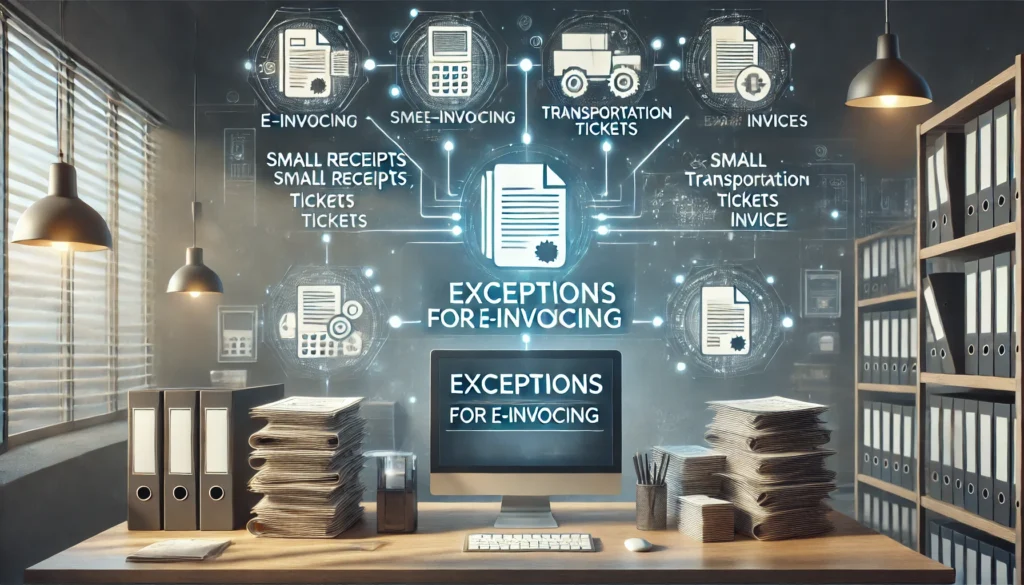
Interim CIO: Dr. Claus Michael Sattler
Exemptions for eInvoicing: Who is exempt from the obligation?

With the introduction of mandatory electronic invoicing (eInvoicing) from January 1, 2025, the German business world is facing a significant change. While most companies need to prepare for this digital transformation, there are some important exceptions to eInvoicing that need to be considered. In this article, we take a detailed look at these exemptions and their impact on different business areas.
Basics of the eInvoice obligation
Before we look at the exceptions, it is important to understand the framework of the eRechnung obligation. From 2025, all companies in Germany must be able to receive and process eInvoices [source: 1]. This applies to taxable supplies and services between entrepreneurs (B2B) in Germany, regardless of whether the business is run as a main or secondary business.
Important exceptions for the eInvoice
The following points expressly do not constitute legal or tax advice. Such advice is expressly reserved for lawyers and tax advisors/auditors or other professional groups trained for this purpose. The following points are a list of researchable exceptions.
1. low-value invoices
One of the most important exceptions for e-invoicing concerns small-value invoices. Invoices with a total amount of up to EUR 250 (including VAT) are not subject to the obligation to issue invoices electronically [source: 1] [source: 2]. These can still be issued as “other invoices”, for example in paper form or as a simple PDF document. This exception makes it easier for small companies and retailers in particular to conduct their day-to-day business.
2. tickets
Similar to low-value invoices, tickets are also exempt from the eRechnung obligation [source: 1] [source: 2]. This applies in particular to tickets for local public transport, train tickets and similar receipts. This exemption simplifies everyday life for many travelers and commuters, who can continue to use conventional tickets without the transport companies having to change their systems.
3. services provided by small entrepreneurs
Another important group that benefits from exemptions for eInvoicing are small businesses within the meaning of Section 19 of the German VAT Act. With effect from January 1, 2025, the sales of small entrepreneurs are exempt from VAT (without the right to deduct input tax) [source: 1] [source: 5]. They are therefore not obliged to issue e-invoices in the new format. They can continue to issue invoices in paper form or another electronic format (e.g. PDF).
However, it is important to note that small businesses are still obliged to receive e-invoices [source: 5]. This means that although they do not have to issue e-invoices, they must be able to receive and process them.
4. tax-free sales
Another important category of exemptions for e-invoicing relates to tax-free transactions. In particular, transactions that are tax-exempt in accordance with Section 4 (8) to (29) of the VAT Act are not subject to the obligation to issue invoices electronically [source: 5] [source: 7]. This includes a large number of services, including
- Tax-free financial services
- Tax-free property rentals
- Certain health and social services
- Educational services
In these cases, issuing an invoice is usually voluntary from a VAT perspective.
5. sales to end consumers (B2C)
An important restriction of the e-invoicing obligation concerns sales to private end consumers, so-called B2C sales [source: 7]. These do not fall under the obligation to issue invoices electronically. This means that companies are still free to choose the invoice format in their business with private customers.
6 Cross-border sales
The e-invoicing obligation only applies to domestic B2B transactions. Cross-border B2B transactions are exempt from the obligation to issue electronic invoices. This applies to both exports and imports of goods and services.
Special cases and transitional arrangements
Companies with low turnover
There is a transitional regulation for smaller companies: companies with an annual turnover of less than 800,000 euros are exempt from the obligation to send eInvoices until the end of 2027 [source: 3]. This regulation is intended to give smaller companies more time to adapt to the technical and organizational requirements of eInvoicing.
New definition of small business status
From January 1, 2025, new limits for small business status will apply: a small business is anyone who had a turnover of no more than 25,000 euros in the previous calendar year and a turnover of no more than 100,000 euros in the current calendar year [source: 6]. This adjustment to the limits (previously EUR 22,000 and EUR 50,000 respectively) extends the group of companies that can benefit from the exemptions for eInvoicing.
Technical aspects and implementation
Although certain transactions are exempt from the eInvoice obligation, companies are free to use electronic invoices in these cases too. This is possible for low-value invoices and tickets if the recipient agrees. This consent can be given informally or implicitly [source: 1].
Challenges and opportunities
The introduction of eInvoicing and the associated exceptions bring both challenges and opportunities:
Challenges
- Technical adaptation: Even companies that benefit from exemptions may have to adapt their systems in order to be able to receive eInvoices.
- Complexity of the regulations: The various exemptions and transitional regulations can be confusing for companies and require a careful examination of their own situation.
- Pressure from business partners: Despite exceptions, larger companies could exert pressure on their smaller partners to use eInvoices in order to simplify their own processes [source: 6].
Opportunities
- Digitization boost: The eInvoice can serve as a catalyst for further digitization measures in the company.
- Increased efficiency: The voluntary use of e-invoices can also lead to efficiency gains for companies affected by exemptions.
- Environmental protection: The reduction of paper invoices contributes to environmental protection and can improve the company’s image.
Conclusion and outlook
The exceptions for eInvoicing offer important simplifications for certain business transactions and types of company. They enable a flexible transition to electronic invoicing and take into account the specific needs of different sectors and company sizes.
Despite these exceptions, the trend towards digitization in accounting is unstoppable. Even companies that are currently exempt from the eInvoicing obligation should not underestimate the benefits of electronic invoicing. The efficiency gains, cost savings and improved data transparency make eInvoicing a valuable tool for companies of all sizes.
It is to be expected that the exceptions for eInvoicing will be further adjusted in the future. In particular, the thresholds for low-value invoices could be revised to take account of general price developments. The transitional regulations for smaller companies could also be extended or modified, depending on experience in the first few years after introduction.
Companies should keep a close eye on developments in this area and prepare for possible changes at an early stage. eInvoicing is not only a legal obligation, but also an opportunity to modernize and optimize your own business processes. Even if your company currently falls under one of the exemptions for eInvoicing, it may make sense to proactively approach the changeover to electronic invoicing processes.
eInvoicing is an important building block in the digital transformation of the economy. With the right preparations and an understanding of the applicable exceptions, companies can successfully master this change and benefit from the advantages of digitalization.
Sources
- https://www.ihk.de/darmstadt/produktmarken/recht-und-fair-play/steuerinfo/bmf-plant-verpflichtende-erechnung-und-meldesystem-5784882
- https://www.zdh.de/ueber-uns/fachbereich-steuern-und-finanzen/elektronische-rechnung/
- https://www.frankfurt-main.ihk.de/recht/uebersicht-alle-rechtsthemen/steuerrecht/umsatzsteuer-national/e-rechnungspflicht-ab-2025-6055774
- https://www.easybill.de/kleinunternehmer-e-rechnung-umstieg
- https://de.ecovis.com/e-rechnung/
- https://www.heise.de/news/Bundesrat-Kleinunternehmer-von-E-Rechnungspflicht-teilweise-befreit-10129342.html
- https://www.bundesfinanzministerium.de/Content/DE/FAQ/e-rechnung.html
- https://www.etl-steuerrecht.de/e-rechnung/regelungen-kleinunternehmer/
- https://www.haufe.de/steuern/gesetzgebung-politik/elektronische-rechnung-wird-pflicht-e-rechnung-im-ueberblick_168_605558.html
- https://www.vgsd.de/erfreulicher-gesetzentwurf-kleinunternehmer-muessen-doch-keine-e-rechnungen-ausstellen-umsatzgrenzen-steigen/
- https://www.ihk.de/dresden/hauptnavigation/recht-steuern/erechnung-6232764
- Image: ChatGPT